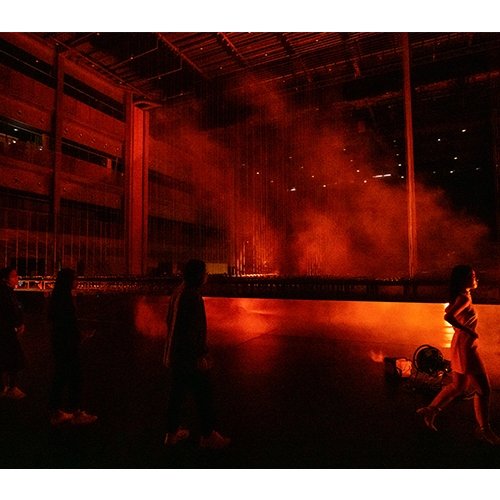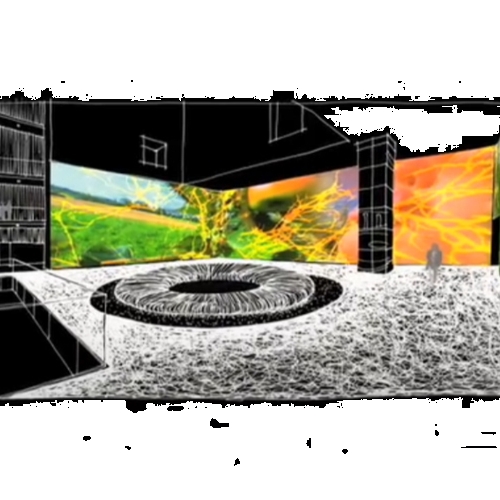1.
There is a kiosk in the cafe that I often visit. A notice detailed instructions to place all orders in the kiosks. I don’t know if it’s because of the COVID-19 or to save labour costs, but I ordered it from a kiosk. In fact, contactless communication is more convenient for people like me who are uncomfortable with small talk. A friendly conversation or greeting at one’s local store is a thing of the past. Communication is daunting so exists primarily through SNS.
The problem is that the transaction takes longer after being replaced by a kiosk. Ordering, which was supposed to be simpler, has become more complicated, with marketing elements sandwiched between menu choices. In addition, people unfamiliar with the machines take ten minutes to place an order that would take one minute. It is not uncommon for a kiosk to breakdown or have buffering issues.
Of course, technology isn't easy. Jeff Bezos, who recently returned from space travel, opened Amazon Go in 2016, claiming it to be a completely unmanned store. In Amazon Go, cameras and black box sensors detect customer behaviour and automatically pay for selected products. In 2021, an unmanned store identical to Amazon Go opened in Korea. Hyundai Seoul's Uncommon Store is a convenience store created through a technology agreement between Hyundai and Amazon. The method is the same as Amazon Go after installing the app, registering your card, and scanning the QR code to enter. If you have something you want, just pick it up and you're done!
It cost about 300 million won to install an unmanned system in the Uncommon Store, a shop of less than 3.3 square metres (40 AI cameras and 150 weight sensors were mobilised). This is technology on a scale regular stores cannot afford, but it will continue advance and the price will presumably decrease. In other words, fully automated stores are not far off in the future. This is good news for business owners who say they will go bankrupt because of the rise in the minimum wage. It is because they have employees who don’t complain and don’t have to pay money.
2.
One of the most famous anecdotes about automation concerns Henry Ford II and Walter Reuther, the President of the National Automobile Union, in the 1950s. Henry Ford II boasted about a new factory equipped with industrial robots and jibed: ‘Does the machine need to join a union?’ Walter Lauder answered with a smile: ‘I suppose so. But will those machines buy cars?’
This anecdote reveals the fundamental contradiction behind automation. Employers want lower-cost employees and consumers with purchasing power, but they can’t have both. To put it simply, your employees are your consumers. In that respect, Henry Ford II’s grandfather, Henry Ford, was much smarter than his grandson. He raised wages more radically than any other company at the time.
There is another anecdote related to automation. Nam June Paik made an early robot and presented it as part of a performance. A reporter asked: ‘What if robots take people's jobs?’ Nam June Paik responded: ‘Don’t worry. It takes five people to move this robot!’
So, the problem with automation may not be unemployment. Unemployment occurs initially when the structure of the industry changes, but alternatives such as welfare or new jobs must (and have) solve this problem. The essential element of capitalism is the consumer, not the worker. The problem lies elsewhere. Jaron Lanier, the inventor behind virtual reality, posed the following: ‘The real question isn't how many things will be automated that will take away jobs. Will there be anything left that will ultimately not be automated?’
In Who Owns the Future?, Jaron Lanier takes this question seriously. When technology advances and machines make machines, and AI reaches the level where AI makes AI, devices will do everything that humans are capable of doing now.
This future is a dystopian one. But Aaron Bastani, author of Fully Automated Luxury Communism, thinks differently. He argues that automation is a shortcut to a communist ‘utopia’, not in a sarcastic or ironic sense, but on serious terms. Even Marx predicted this 200 years ago. The following passage is found in the short article The Fragment of Machines ‘Fundamentals of a Critique of Political Economy (Grundrisse)’, which remains unfinished: ‘This will redound to the benefit of emancipated labour, and is the condition of its emancipation’.▼1 Marx's famous diagnosis that communism is inevitable when capitalism develops in the extreme is the story of an automation that has reached the limits of technological advancement. The distinction between work and leisure will come to an end, and scarcity, the heart of classical economics, will also come to an end. Labour will become play, not work. Aaron Bastani argues that using technology wisely can solve everything from poverty and inequality to environmental pollution and the depletion of resources. Therefore, communism is the dream of an era of complete automation. In the future, human beings will immerse themselves in purely creative play in a more egalitarian and prosperous world.
3.
Fortnite, a third-person shooter game, is attracting attention as a future media outlet that leads the metaverse trend. As of 2020, there were over 350 million users, and 40% of U.S. teens spend 25% of their leisure time in Fortnite. Fortnite is a game, a social platform and an OTT (Over-the-top) – 27.7 million people attended Travis Scott’s concert in Fortnite.
Fortnite has a creative mode called Creative. It is a game mode in which you can freely edit the map and unlimited resources are provided to users. ‘If you have a cool idea for a Fortnite experience, build it on your own island. As long as you’re having fun in Creative, there’s no limit to where your imagination can take you.’▼2
The creative mode is almost identical to the communist principles Aaron Bastani describes in Fully Automated Luxury Communism. ‘It is an infinite supply of information, labour and resources.’▼3 It is the so-called fully automated luxury space. Of course, this is only when the best-case scenario is realised. It is easy to criticise something impossible. A techno-utopia where people use technology for everyone – that’s not possible! But let’s revolutionise our thinking. The important thing is to imagine what our lives would be like when full automation is achieved, rather than common-sense criticism – it's too common sense to think about it – that suggests such a thing would be impossible. What if our life becomes a real life Creative mode? What if there is no one working at all the shops, factories, or companies?
The most important aspect of Fortnite for users is the ability to construct space. Users build their own world, experience omnipotence, and enjoy and rebuild other users' worlds (games within games). In this endless loop of play, consumers/creators can ‘unleash their imaginations’, the developer says. However, there is a limit. Every consumption of space and creation takes place within the conditions of the game and cannot affect the game itself. If so, is the omnipotence at this time actually incompetent? The reality of a fully automated, luxury space might be here anyway: with the ability to do anything but without meaning, we are no longer needed in this space. Just as we no longer need God.
1 Aaron Bastani, Fully Automated Luxury Communism, trans. Kim Minsoo and Yoon Jongeun, Seoul: Hwangsogeoleum, 2021.
2 ‘Creative’ entry on Epic Games’ Fortnite webpage.
https://www.epicgames.com/fortnite/ko/creative/docs/getting-started-in-fortnite-creative
3 Aaron Bastani, Op. cit.












